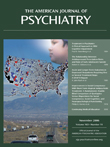To the Editor: Drs. Mossman and Morse raise several interesting and important points in their letter, and we address each of them in turn.
First, they question our conclusions by suggesting that differences in the “capacity for rationality” associated with different psychiatric disorders may have determined our respondents’ judgments of responsibility, rather than assumed biological or psychological etiology. This suggestion, while intriguing and potentially fruitful as an avenue for further research, does not preclude our study’s conclusions. The simple fact that scores for biological and psychological etiology were inversely correlated across the vignettes supports the conclusion that a mind-brain dichotomy informs psychiatric clinical reasoning. Mind-brain dualism is indeed a complex phenomenon, and in our article, we acknowledge the fact that other factors besides judgments of responsibility may underlie this dichotomy. However, it was not necessary to control for all such potential factors in our experiment because there is no reason to assume that human causal reasoning processes cannot be determined by multiple factors or that various domains of causal reasoning cannot be interrelated.
The commentators then argue that the vignettes of the antidepressant-induced manic episode were biased because they included a “clearly biological cause,” whereas the cause was left unspecified in the personality disorder vignettes. Although an antidepressant may trigger a manic episode, the causes of bipolar disorder remain as elusive as those of the personality disorders. Moreover, the personality disorder vignettes also described a trigger, which in those cases was an interpersonal one. There is no evidence that the effects of an interpersonal stressor are any less biological in nature than those of an antidepressant. The fact that most clinicians consider an antidepressant to be more “biological” is exactly the sort of reasoning that we sought to expose and explicate in our study.
Drs. Mossman and Morse also object to our conclusions regarding our respondents’ appraisals of different clinical conditions and suspect that it may have been the actual behaviors in these vignettes (bankruptcy, stabbing the wife, contracting human immunodeficiency virus [HIV]) that led to these appraisals. However, as we reported in our article, the three behaviors in the vignettes did not account for any significant differences in the scores of biological or psychological etiology using multivariate repeated-measures analysis of variance, and although the responsibility scores did show a statistically significant difference in this test, this difference was only a slight one between the HIV-risk and wife-stabbing behaviors. In contrast, the three vignette conditions (mania, narcissistic personality disorder, heroin addiction) showed robust differences with respect to biological and psychological etiology and responsibility scores. It is based on these results that we were able to conclude that the vignette conditions, much more than the specific behaviors, determined the respondents’ attributions.
Certainly, it is important to distinguish causality, responsibility, and blame in moral and legal reasoning
(1) . However, everyday reasoning often conflates and confounds these dimensions or uses them for strategic purposes
(2), and it precisely this confusion that constitutes the problematic aspect of the persistent mind-brain dualism we find in clinical reasoning.

